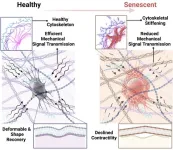(Press-News.org) Long-term exposure to high levels of air pollution may harm the brain health of older adults in England, finds a new study led by UCL researchers.
The research, published in The Journals of Gerontology: Series A, found that exposure to nitrogen dioxide (NO₂) and fine particulate matter (PM2.5) is linked to lower scores in key cognitive abilities, particularly language skills.
NO₂ mainly enters the atmosphere through fuel combustion, originating from emissions of vehicles like cars, trucks, and buses, as well as power plants and off-road machinery. PM2.5 pollution in outdoor air often originates from the combustion of gasoline, oil, diesel fuel, or wood, and consists of tiny particles that can be inhaled deeply into the lungs.
The researchers analysed data from 1,127 adults aged 65 and over who took part in the ELSA Harmonised Cognitive Assessment Protocol (ELSA-HCAP) in 2018.
The team examined exposure to air pollution over an eight to 10 year period (2008-2017) and assessed participants’ memory, executive function (i.e. making plans, solving problems and adapting to new situations), language, and overall cognitive function.
Participants completed a range of well-established neurocognitive memory assessments such as the “East Boston Memory Test” and the “Wechsler Memory Scale”, alongside immediate and delayed recall, backwards counting tasks, and shape drawing.
The findings showed that individuals residing in areas with the highest levels of NO₂ and PM2.5 performed worse on cognitive tests compared to those living in areas with average pollution levels. The most compelling evidence of association was observed in language skills, with individuals in the most polluted areas scoring in the bottom third of the cognitive tests performed.
The study also found that different sources of air pollution have varying effects on cognitive health. For example, pollution from industries, home heating, and combustion of fuels (like coal and oil) were strongly linked to poorer language performance (i.e. the ability to access and produce words quickly).
The authors did not examine the reasons behind their findings but suggest that this may be because increased air pollution exposure is most strongly associated with impairment in the temporal lobe (the part of the brain which is essential for language and semantic fluency). Further research is needed to understand these links.
Lead author Dr Giorgio Di Gessa (UCL Epidemiology & Health) said: "Our study shows that air pollution is not just harmful to the lungs and heart but also to brain health, especially when people are exposed to high levels for long periods.
“The most consistent links we found were with language ability, which may indicate that certain pollutants have a specific effect on particular cognitive processes."
Consequently, the researchers urge policymakers to strengthen air quality regulations, particularly in areas where pollution levels remain high, to help protect brain health as the population ages.
Deputy director of the ELSA study, Professor Paola Zaninotto (UCL Epidemiology & Health), said: “By tracking pollution levels over a decade using high-quality data, our research provides robust evidence that sustained exposure to pollutants is damaging people’s brains."
ELSA is funded by the National Institute on Aging and by UK Government Departments coordinated by the National Institute for Health and Care Research (NIHR).
Study limitations
The air pollution data used in the study only covers 10 years, which may not accurately represent lifetime exposure.
Meanwhile, yearly averages of pollution levels were used, missing short-term high exposure impacts.
Additionally, the study sample is small and limited to England, which may not reflect broader trends.
END
Exposure to air pollution may harm brain health of older adults
Peer-reviewed | Observational study | People
2025-04-07
ELSE PRESS RELEASES FROM THIS DATE:
New study investigates effects of ADHD medications on the heart
2025-04-06
UNDER EMBARGO UNTIL 23.30 UK TIME ON SUNDAY 6TH APRIL 2025
New study investigates effects of ADHD medications on the heart
A new study led by the University of Southampton has found that medications for ADHD have overall small effects on blood pressure and heart rate after weeks or a few months of use.
There have been concerns about the side effects of ADHD medications but the new findings, coupled with other studies, suggest that the benefits of taking these medications outweigh the risks, while highlighting the need for careful monitoring.
The study, published in ...
Research to tackle Prymnesium algal blooms which affect fish populations
2025-04-06
A scientific initiative to combat harmful Prymnesium algal blooms in the Broads is gaining fresh momentum, thanks to a renewed collaboration between the University of East Anglia (UEA), the Environment Agency, the Broads Authority, and the Norfolk pike angling community.
Prymnesium algal blooms can occur on the Broads and produce toxins that threaten fish stocks, local biodiversity, and East Anglia’s thriving angling industry, which contributes more than £100 million annually to the local economy.
The golden algae Prymnesium parvum is therefore of significant research interest to ...
Climate and health litigation mounting in Australia as exposure to heatwaves grows
2025-04-06
Australia’s exposure to extreme heat continues to grow while the country has emerged as a global hotspot for climate change litigation, according to the latest MJA–Lancet Countdown report.
Released today, the report reveals Australia has experienced a 37 per cent increase in excess heat factor over the past 20 years.
Lead author and Director of the Lancet Countdown Centre in Oceania, Professor Paul Beggs from Macquarie University, says these findings underscore the importance of long-term tracking of climate hazards and exposures in Australia.
“The frequency of health-damaging heat has increased substantially since the 1970s," says Professor Beggs.
The ...
Young females more likely to experience higher social anxiety due to excessive smartphone use than other genders
2025-04-06
EMBAROGED UNTIL SUNDAY 6TH APRIL AT 08:00 CEST
YOUNG FEMALES MORE LIKELY TO EXPERIENCE HIGHER SOCIAL ANXIETY DUE TO EXCESSIVE SMARATPHONE USE THAN OTHER GENDERS
Sunday 6th April 08:00 CEST - A new study presented today at the European Psychiatric Association Congress 2025 reveals that gender plays a significant role in excessive and problematic (psychological or behavioural dependence)1 smartphone use, with young females more likely to experience higher social anxiety than other genders. In the study, it was also found that gender was significantly linked to the amount of time spent using smartphones ...
New research boosts future whooping cough vaccines
2025-04-04
Whooping cough, or pertussis, was once a leading cause of death for children in the U.S. and worldwide before the introduction of vaccines in the 1940s. In the decades since, the bacterial disease was nearly eradicated in the U.S., with fatalities falling to double digits each year.
But the disease has made a troubling comeback in recent years as vaccine coverage declined after the COVID-19 pandemic. In 2024, several outbreaks left public health officials and hospitals scrambling to accommodate a sudden influx of patients, primarily infants, who are often too young to be vaccinated and suffer the most severe symptoms.
Now, new research from The University of Texas at Austin could aid ...
Mechanistic understanding could enable better fast-charging batteries
2025-04-04
MADISON — Fast-charging lithium-ion batteries are ubiquitous, powering everything from cellphones and laptops to electric vehicles. They’re also notorious for overheating or catching fire.
Now, with an innovative computational model, a University of Wisconsin–Madison mechanical engineer has gained new understanding of a phenomenon that causes lithium-ion batteries to fail.
Developed by Weiyu Li, an assistant professor of mechanical engineering at UW–Madison, the model explains lithium plating, in which fast charging triggers metallic lithium to build up on the surface of a battery’s anode, causing the battery to ...
No bones about it: new details about skeletal cell aging revealed
2025-04-04
It's no coincidence that our bodies feel a little creakier as we age. The trillions of cells that make up our skeleton age too, and some change in ways that weaken the very structure of our bones.
Scientists and researchers around the globe are investigating a series of mysteries about what happens to our bones over time. In a new study, a team led by The University of Texas at Austin, in collaboration with Mayo Clinic and Cedars-Sinai Medical Center just made a major break in the case. New research found that osteocytes undergo dramatic structural and functional changes ...
UNM scientists discover how nanoparticles of toxic metal used in MRI scans infiltrate human tissue
2025-04-04
University of New Mexico researchers studying the health risks posed by gadolinium, a toxic rare earth metal used in MRI scans, have found that oxalic acid, a molecule found in many foods, can generate nanoparticles of the metal in human tissues.
In a new paper published in the journal Magnetic Resonance Imaging, a team led by Brent Wagner, MD, professor in the Department of Internal Medicine in the UNM School of Medicine, sought to explain the formation of the nanoparticles, which have been associated with serious health problems in the kidneys and other organs.
“The worst disease caused by MRI contrast agents is nephrogenic systemic ...
UMaine research examines best methods for growing Atlantic sea scallops
2025-04-04
A new study from the University of Maine’s Aquaculture Research Institute (ARI) and Darling Marine Center is helping to refine best practices for growing Atlantic sea scallops (Placopecten magellanicus), a species of increasing interest to Maine’s aquaculture sector.
Published in the academic journal Aquaculture, the research compares two scallop farming methods, ear-hanging and lantern net culture, over a complete grow-out cycle to determine which approach yields the best results for commercial growers. The study, led by UMaine ...
Medical cannabis could speed recovery, especially at community recovery homes
2025-04-04
A new pilot study from UBC Okanagan and Thompson Rivers University examined how medically supervised cannabis use in a residential recovery home may support people in treatment for substance use challenges.
Participants reported that cannabis helped them manage pain, anxiety, depression and sleep issues—key symptoms that can complicate recovery.
"Our findings suggest medical cannabis could play a meaningful role in reducing cravings and improving retention in recovery programs," says ...
LAST 30 PRESS RELEASES:
Why chronic pain lasts longer in women: Immune cells offer clues
Toxic exposure creates epigenetic disease risk over 20 generations
More time spent on social media linked to steroid use intentions among boys and men
New study suggests a “kick it while it’s down” approach to cancer treatment could improve cure rates
Milken Institute, Ann Theodore Foundation launch new grant to support clinical trial for potential sarcoidosis treatment
New strategies boost effectiveness of CAR-NK therapy against cancer
Study: Adolescent cannabis use linked to doubling risk of psychotic and bipolar disorders
Invisible harms: drug-related deaths spike after hurricanes and tropical storms
Adolescent cannabis use and risk of psychotic, bipolar, depressive, and anxiety disorders
Anxiety, depression, and care barriers in adults with intellectual and developmental disabilities
Study: Anxiety, gloom often accompany intellectual deficits
Massage Therapy Foundation awards $300,000 research grant to the University of Denver
Gastrointestinal toxicity linked to targeted cancer therapies in the United States
Countdown to the Bial Award in Biomedicine 2025
Blood marker from dementia research could help track aging across the animal world
Birds change altitude to survive epic journeys across deserts and seas
Here's why you need a backup for the map on your phone
ACS Central Science | Researchers from Insilico Medicine and Lilly publish foundational vision for fully autonomous “Prompt-to-Drug” pharmaceutical R&D
Increasing the number of coronary interventions in patients with acute myocardial infarction does not appear to reduce death rates
Tackling uplift resistance in tall infrastructures sustainably
Novel wireless origami-inspired smart cushioning device for safer logistics
Hidden genetic mismatch, which triples the risk of a life-threatening immune attack after cord blood transplantation
Physical function is a crucial predictor of survival after heart failure
Striking genomic architecture discovered in embryonic reproductive cells before they start developing into sperm and eggs
Screening improves early detection of colorectal cancer
New data on spontaneous coronary artery dissection (SCAD) – a common cause of heart attacks in younger women
How root growth is stimulated by nitrate: Researchers decipher signalling chain
Scientists reveal our best- and worst-case scenarios for a warming Antarctica
Cleaner fish show intelligence typical of mammals
AABNet and partners launch landmark guide on the conservation of African livestock genetic resources and sustainable breeding strategies
[Press-News.org] Exposure to air pollution may harm brain health of older adultsPeer-reviewed | Observational study | People



